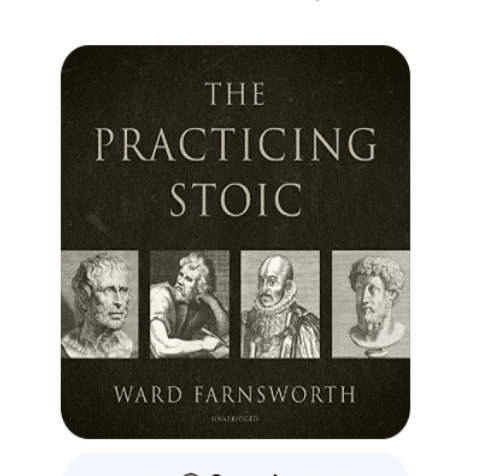By: Ward Farnsworth
Ward Farnsworth (born 1967)[1] is a Professor of Law and holder of the W. Page Keeton Chair at the University of Texas School of Law, where he was Dean from 2012 to 2022.
Farnsworth has written on a wide range of subjects. His legal writing includes articles on economic analysis of law, constitutional law, statutory interpretation, and legal applications of cognitive psychology. Farnsworth is the author of three books on the English language: Classical English Rhetoric (Godine 2010), Classical English Metaphor (Godine 2016), and Classical English Style (Godine 2020), all of which have received critical acclaim. He is also the author of two books on philosophy, The Practicing Stoic (Godine 2018) and The Socratic Method (Godine, 2021), and a treatise on chess, which is available online. (Wikipedia)
Over the centuries, many dedicated individuals have developed the Stoic philosophy. The literature on Stoicism we have today is often a collection of quotes and singular ideas, leaving us to piece together a comprehensive understanding of the philosophy. Ward Farnsworth, however, has taken a unique and well-organized approach, providing a two-dimensional exploration of Stoicism that is sure to intrigue and satisfy the curious reader.
First, Ward compiled a list of the primary topics that formed the focal points of the Stoic philosopher’s concerns, which became his chapter headings.
1. Judgement
2. Externals
3. Perspective
4. Death
5. Desire
6. Wealth and Pleasure
7. What Others Think
8. Valuation
9. Emotion
10. Adversity
11. Virtue
12. Learning
13. Critics of Stoicism
For each of these focal points, Professor Farnsworth not only collected the commentary from the principal founders and authorities of Stoicism, but also compared each position and offered his personal, engaging commentary. This personal touch makes the reader feel connected to the author’s perspective.
The principal founders were Seneca, Epictetus, and Marcus Aurelius. Ward Farnsworth also occasionally draws on the wisdom of Schopenhauer, Adam Smith, Plutarch, and Montaigne when appropriate.
For a clear and comprehensive understanding of Stoicism, this is your source.
Prior to commenting, please review our privacy policy at: http://findnewcontent.com/privacy/



